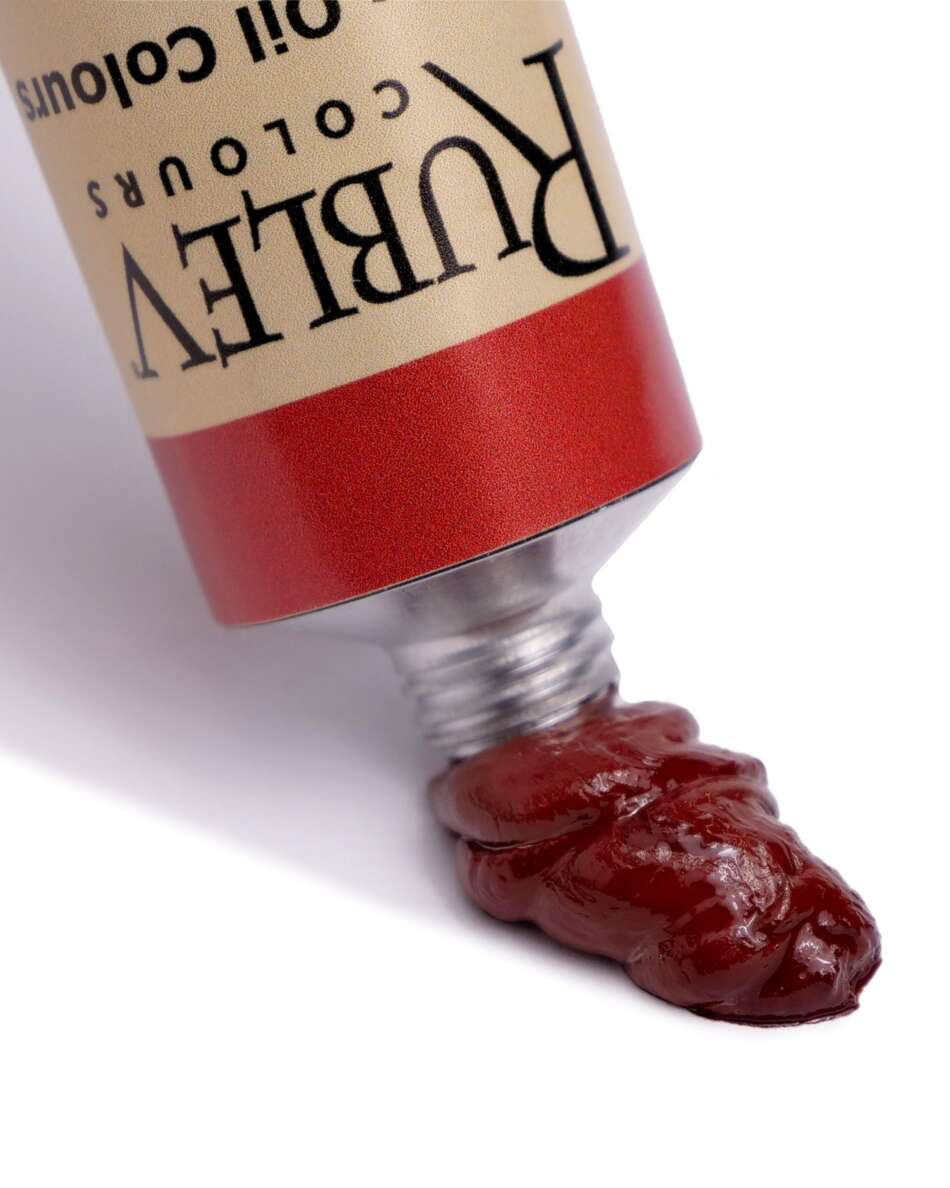Indian Red Oil Paint
Indian Red is a single pigment color made of natural iron oxide minerals from deposits near Chennai (also known as Madras), the capital city of the Indian state of Tamil Nadu. Iron ores exist in great abundance throughout the Indian Peninsula and are widely distributed. The quality of these ores is usually excellent, with a high ferric oxide content, typically above 90%.
Red iron oxide or ferric oxide is the principal coloring agent in red earths, such as Indian Red. This color is based on the natural mineral hematite associated with varying proportions of other minerals such as clay, chalk, and silica. They differ from other ochers in that they do not contain water. In other words, the iron to which they owe their color is iron oxide, not hydrated iron oxide.
Natural red oxides, such as Indian red, are very opaque, permanent, and have excellent covering power. They are strong absorbers of ultraviolet light. The best bluish shades are called Indian red. Formerly there was much confusion in the terminology of the red iron oxides; the names provided in the Color Names table are those specified in the ASTM Standard.
Composition and Permanence
| Indian Red | |
| Color: | Indian Red |
| Binder: | Linseed oil |
| Additive(s): | None |
| Pigment Information | |
| Pigment: | Indian Red |
| Pigment Classification: | Natural inorganic |
| Colour Index: | Pigment Red 102 (77491) |
| Chemical Name: | Natural Iron Oxide |
| Chemical Formula: | Fe2O3 |
| CAS No. | 1309-37-1 37338-85-5 |
| Properties | |
| Code: | 505 |
| Series: | 2 |
| Opacity: | Opaque |
| Tinting Strength: | High |
| Drying Rate: | Medium |
| ASTM Lightfastness: | I |
| Permanence: | A - Permanent |
| Safety Information: | No acute or known chronic health hazards are associated with this product's anticipated use (most chemicals are not thoroughly tested for chronic toxicity). Protect yourself against potentially unknown chronic hazards of this and other chemical products by keeping them out of your body. Do this by avoiding ingestion, excessive skin contact, and inhaling spraying mists, sanding dust, and vapors from heating. Conforms to ASTM D-4236 |
For a detailed explanation of the terms in the table above, please visit Composition and Permanence.
Notes
Some separation of pigment and oil may occur in Rublev Colours Artist Oils and is a natural process when no wax or stabilizers are added to paint to prevent this from occurring.
All images of color swatches on this website are only approximations of the actual color of the oil paint. We have carefully matched the color in these pictures on calibrated color monitors to the actual color. However, because of the wide variance in color monitors, the results may vary.
Color Swatch Note: The color swatch was created with a thick application (left side) of color and a tint (right side) made with equal parts of color and titanium white and applied on acrylic primed cotton canvas.
Drawdown Note: The image of the "drawdown" contains a pre-mixed paint film of 6 mils (0.006 inches) thickness applied to a standard test card to examine color consistency, opacity, and other qualities. The drawdowns show the full-color strength (mass tone) on the left and mixed in a 1:2 ratio with titanium white on the right. The bottom area of the drawdowns is scraped to show undertones.
| Color Names | |
| Common Names: | English: red oxide French: oxyde rouge German: Oxid rot Italian: rosso ossido Portuguese: vermelho óxido Spanish: rojo óxido |
| Synonymous Names: | English: Indian red French: rouge Indien Spanish: rojo Indio |
| Alternate Names: | Mars red is the name given to the synthetic substitute of natural red iron oxide. |
| SKU | 820-505 |
|---|---|
| Brand | Rublev Colours |
| Vendor | Rublev Colours |
| Processing Time | Usually ships the next business day. |
| Color | Red |
| Pigment Type | Inorganic, Earth, Natural |
Health & Safety: There are no acute or known chronic health hazards with the anticipated use of this product (most chemicals are not thoroughly tested for chronic toxicity). Protect yourself against potentially unknown chronic hazards of this and other chemical products by avoiding ingestion, excessive skin contact, and inhaling spraying mists, sanding dust, and concentrated vapors from heating. Contact us for further information or consult the SDS for more information. Conforms to ASTM D-4236.


